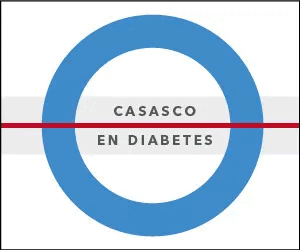Symposium: Therapeutic approach. Bariatric surgery and beta cell
DOI:
https://doi.org/10.47196/diab.v55i3Sup.504Keywords:
diabetes, bariatric surgeryAbstract
Multiple studies carried out on patients with obesity who underwent bariatric surgery, either with gastric bypass, biliopancreatic diversion with duodenal switch or vertical gastrectomy (gastric sleeve) have proven diabetes remission. The reasons to justify said beneficial changes include postoperative GLP1 and GIP increase, weight decrease with reduction of adipose tissue with proinflammatory cytokines, ghrelin reduction, increased insulin sensitivity and bile acid impact.
Considering the main role of beta cells to maintain normoglycemia, a randomized study was carried out exposing serum samples from obesity and diabetes patients undergoing bariatric surgery (vertical gastrectomy) into beta cells culture and comparing it with sera of conventionally treated patients.
Cells exposed to sera from LSG-treated participants exhibited increased viability and proliferation, diminished levels of ROS and p53, enhanced protein expression of autophagy-related SIRT1 and p62/SQSTM1, significantly decreased transcript levels of ER stress markers, and augmented insulin expression. At 6-month follow-up, patients undergoing surgery achieved adequate glycemic control, whereas conventionally treated patients did not. This implies that circulating factors in patients with improved diabetes after bariatric surgery exerted favorable effects on beta cell function and survival.
References
I. Constantin A, et al. Sera of obese type 2 diabetic patients undergoing metabolic surgery instead of conventional treatment exert beneficial effects on beta cell survival and function: results of a randomized clinical study. Obesity surgery 2019; 29(5):1585-1497.
II. Pories W, Dohm G. Letter to the editor: Sera of obese type 2 diabetic patients undergoing metabolic surgery instead of conventional treatment exert beneficial effects on beta cell survival and function: results of a randomized clinical study. Obesity surgery 2020; 30(9):3603-3604.
III. Jans A. Duration of type 2 diabetes and remission rates after bariatric surgery in Sweden 2007-2015: A registry-based cohort study. PLoS M.2019 Nov 20;16(11).
IV. Russel SM, et al. Physiologic mechanisms of type II diabetes mellitus remission following bariatric surgery: a meta-analysis and clinical implications. Journal of Gastrointestinal Surgery 2020 Mar;24(3):728-741.
Downloads
Published
How to Cite
Issue
Section
License
Copyright (c) 2021 on behalf of the authors. Reproduction rights: Argentine Diabetes Society.

This work is licensed under a Creative Commons Attribution-NonCommercial-NoDerivatives 4.0 International License.
Dirección Nacional de Derecho de Autor, Exp. N° 5.333.129. Instituto Nacional de la Propiedad Industrial, Marca «Revista de la Sociedad Argentina de Diabetes - Asociación Civil» N° de concesión 2.605.405 y N° de disposición 1.404/13.
La Revista de la SAD está licenciada bajo Licencia Creative Commons Atribución – No Comercial – Sin Obra Derivada 4.0 Internacional.
Por otra parte, la Revista SAD permite que los autores mantengan los derechos de autor sin restricciones.







































